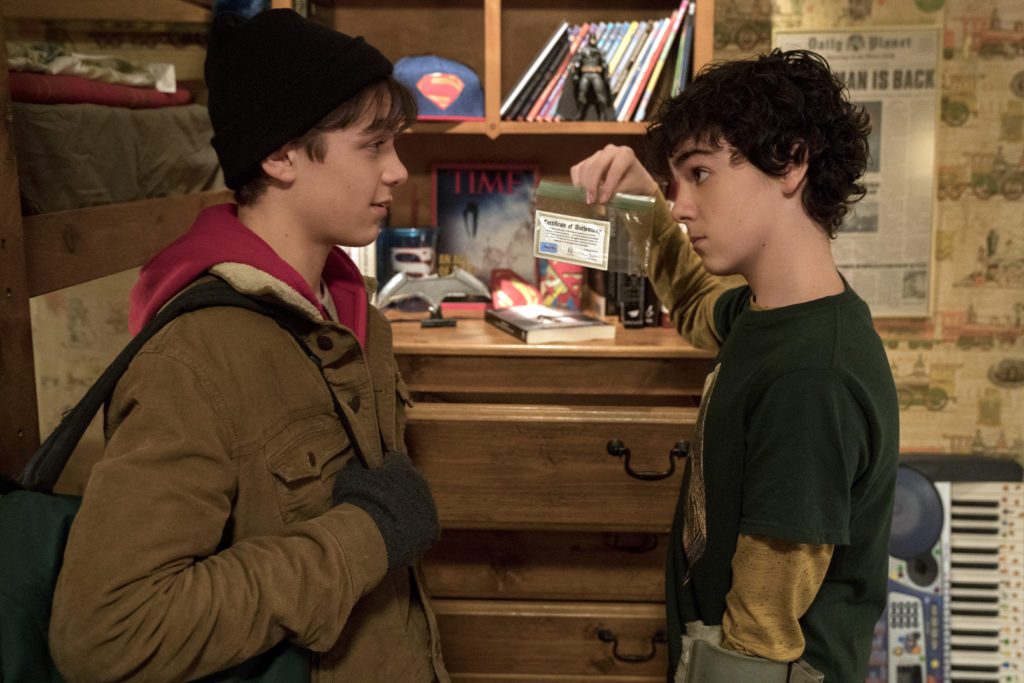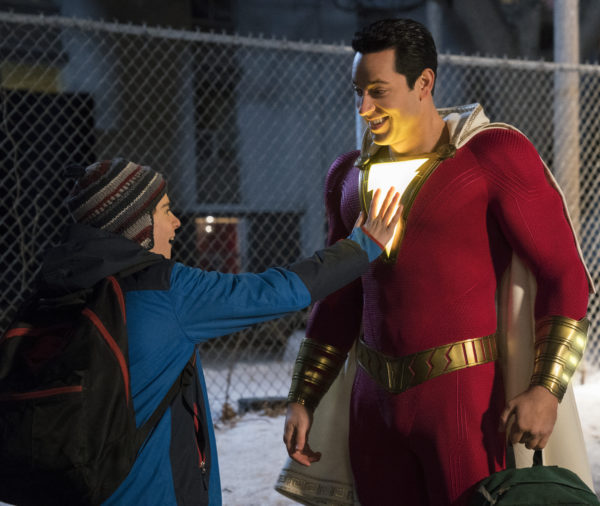DC Comics’ superhero Shazam (also known for many years as Captain Marvel until Marvel Comics shut that down) debuted in 1940 and was one of the most popular comic book characters of the 1940s. He starred in a 1941 movie serial and had his own live-action and animated TV series in the 1970s and 1980s, respectively. But amazingly in this comic-mad world, Shazam hasn’t been given his own feature film until now.
A decade and a half in development, the Warner Bros.-New Line production stars Asher Angel as Billy Batson, a 14-year-old foster kid whose encounter with an ancient wizard enables him to transform into an adult with an array of superpowers. All he needs to do is shout the word “Shazam!” Zachary Levi (TV’s “Chuck”) plays the grown-up Billy, aka Shazam, whose emergence attracts the notice of Dr. Thaddeus Sivana (Mark Strong), a powerful villain still brooding over his own ill-fated meeting with that same wizard. Opening on April 5, Shazam! marks a major career step for Swedish director David F. Sandberg, whose two previous features were horror hits for Warner Bros. and New Line: Lights Out (2016) and Annabelle: Creation (2017). We spoke with Sandberg by phone.
How familiar were you with the whole DC world, and especially with these characters?
I’m quite familiar with DC, not as familiar with this character. It was a bit of an introduction for me. The studio came to me and said, ‘Would you be interested in Shazam?’ I’d heard of him, but I didn’t know that much about him, and they sort of pitched it to me as Big but with superpowers, which to me seemed like the best movie idea ever. A kid turning into an adult is fun, but also gaining superpowers opens up so much more fun.
Your previous two films were horror films, so what motivated the studio to come to you for this project?
I’m not sure. I mean, I did work with kids a lot, especially on my previous movie and even my first movie, which turned out pretty good. And there are a lot of kids in this movie. And I always try, even in my horror movies, to put humor in there, even though I don’t think it always comes through just because people are scared and don’t even notice.
Would you say you were ready to take on a bigger-budget superhero film? Was this your time?
Yeah. You want to take on bigger challenges, and so far each movie has been a bigger one. On the first movie, I’d never been on a film set … I don’t know if you’ll ever be completely ready, but it’s a challenge I’ll gladly take on.
One thing I’m curious about: This is obviously a film meant for a wide age range, for a young audience and an older audience. Yet there are some scenes in this movie that are pretty harrowing. How difficult was it to get the right tone for this?
To me, it was important that, even if it’s a movie for a younger audience …when I was a kid, I loved Jurassic Park and Raiders of the Lost Ark, which actually had some real stakes in them and some pretty intense scenes. But they’re not gory, really. Well, I guess you could make a case for Raiders of the Lost Ark with the faces melting. In Jurassic Park you actually have people dying, to make sure that you know the antagonists are a real threat. I think that’s important, so you get the full experience,
So you’ve worked with younger actors before. Do you get a lot of pleasure out of doing that and coaxing performances out of them?
I do enjoy it. I mean, they’re always so enthusiastic and happy to work. The only downside is that they can’t work very long hours—you have to work around that. And sometimes the younger they are, you can’t really do long takes, which I like to do. You have to get these little snippets of performance. But kids are just really easy to work with—at least the ones I’ve worked with have been super-professional. They hit their marks and do their thing and they really take things seriously, they really study the script and know everything by heart. I’m continuously impressed by the work ethic of kid actors.
Did you do any kind of exercises to make them have the camaraderie of a family?
There wasn’t really much that needed to be done, because they started hanging out up in Toronto and even before the shoot. They seemed like a family, not just the kids but Cooper [Andrews] and Marta [Milans], who play their foster parents—they would hang out with them as well. So they were like a little family and they would go do all these fun things while I was still on the set.
Tell me how you arrived at the casting of Zachary Levi. Was that a pretty obvious choice for you, or did it take a while?
Well, it took a while to find him, because we did a pretty extensive search. We did a lot of auditions and met with a lot of people to make sure we found the right person to play this. We wanted to make sure whoever wanted this part would come in and audition, just because it’s quite unusual to have adults playing kids basically. We really needed to see it. I think we saw over a hundred people in person and on tape, and one of the last tapes to come in was Zach’s. And when I saw it, it was like, clearly he’s the one—he just felt like a big kid at heart, you know? And when he is Shazam, he plays it enthusiastic rather than dumb. I think a sort of default acting for a lot of adults is: Oh, I’m a kid, now I’m stupid. He plays it as more enthusiastic, which feels more genuine.
I wasn’t that familiar with him. I hadn’t seen ‘Chuck,’ which was a big TV show he was on. So I wasn’t colored by the character he played there—to me, he was a fresh face and he just embodied Shazam.
I have to believe as a film fan you already knew Mark Strong’s work pretty well. Was that a no-brainer, casting him?
Yeah. He’s one of those guys where you sort of realize that you’ve seen him in more things than you even know. Looking back, I was like: Oh, he was the guy in RocknRolla! All of these movies … all right, that was him! He really blends into his roles. It was Peter Safran, the producer, we were just trying to come up with names and … Mark Strong, of course, he’s the obvious guy. I’ve seen a lot of people online fan-casting him in the past as Lex Luthor, and he’s the Lex Luthor of the Shazam world.

What message do you hope this movie conveys to an audience?
That anyone can be a hero, that there’s a hero in everyone. And that family is something that’s not necessarily by blood, it’s something that you can find.
It’s such a nice extra layer to have in this film, the portrait of a foster family—you don’t see that that often in movies. And I think it really gives the film a lot of heart.
Yeah, it’s the good side of it. They’re a very happy and put-together family. It’s not the typical ‘Oh, foster family! These parents are bad.’ They’re actually happy and living great lives.
How important is it to you that people see this movie on a big screen?
It’s the way it’s meant to be seen. There’s nothing that beats the theater experience. No matter what sort of home theater you have, it’s never the same. Even here at the office, we have a screening room where we look at shots, and then when you take it to a big mixing stage or see it in an actual theatrical space, it’s so different. You see even more on a giant screen—to me, there’s nothing beating it. And especially for a film like this that has a lot of comedy, you want to see it with other people—it just makes the experience so much better. There are moments in this movie when we’ve screened it that get cheers and applause. It’s so satisfying seeing that. Partly why I’m a director and why I’ve made horror movies in the past is sort of the same thing: the experience of seeing it with other people. It just enhances the movie.
What would you say are some of your essential moviegoing memories from your younger days?
Tim Burton’s Batman Returns may have been the first one I saw when I was very young. And Jurassic Park. A lot of those late ’80s, early ’90s movies. I’m a sucker for those big spectacle movies.
Did you always want to be a filmmaker?
Yeah. For me, it’s never really been an option [not to be]. Which is kind of funny, because I grew up in Sweden and my plan was always: I’m going to be a filmmaker in Hollywood. But you can’t say that out loud when you’re all the way on the other side of the world. But then it actually happened; that dream actually came true. I’ve been here four years now making movies and I’m still like, holy shit, it actually happened somehow. It’s pretty amazing.
How was the experience of dealing with both big stunts and CGI? Is it grueling or is it fun?
It’s not fun shooting it, just because it’s so technical. It takes a long time to set up and you don’t get that immediate result if you have CGI characters and CGI environments—you won’t see what it actually looks like until months later. So it’s less fun to shoot but more spectacular and more fun once it’s done. It’s a little hard as well as for the actors to get into where they are at that point in the scene—you might shoot a part of a scene weeks later in a different environment and you have to piece it all together. So it’s a bit of a challenge. But it’s the only way to make big action scenes.
Can you tell me what you’re working on next?
Next I’m going to take a break. It’s been nonstop for me, because I came here with Lights Out after I made that [as a] short film. Then I went into Annabelle: Creation before Lights Out was even in theaters, and then I went into this before Annabelle was out in theaters. I really haven’t had any vacation or any time off for four years. So, time off to be with my family and enjoy life for a little bit.



Share this post